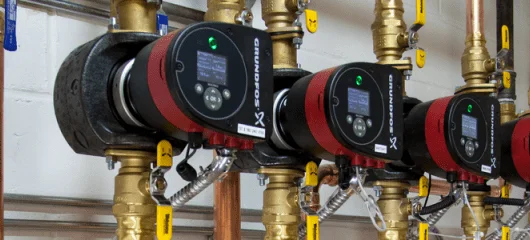Yes, closely spaced tees do work and so do thermal storage tanks. Let’s look at some facts about hydraulic separators (a.k.a. low loss headers, or de-couplers), closely spaced tees and tanks:
As stated in idronics #15: "Any component, or combination of components, that has very low head loss, and is common to two or more hydronic circuits, can provide hydraulic separation between those circuits.”
A hydraulic separator reduces flow velocity, in the vessel, which allows for two secondary functions - air removal and dirt removal - in one device. 3-in-1 hydraulic separators make air removal and dirt removal primary functions, along with hydraulic separation, with no added piping connections or installation costs. Magnetic dirt removal adds a fourth function to the above. Caleffi’s SEP4™ is available in sizes 1” to 2”. Magnetic separation is especially effective for older system retrofits which can contain a high amount of magnetic iron and steel particles.
Closely spaced tees are easier to insulate and cheaper to buy (can’t argue with that) but they don’t necessarily save installation labor compared to hydraulic separators.
A system with closely spaced tees still requires air and dirt removal devices.
Locating a thermal storage tank between primary and secondary piping offers the added advantage of hydraulic separation, in addition to having a buffer tank. Separate air and dirt removal devices are still required.
Thanks for reading,
Kevin Freidt










I wonder if any of our blog readers can guess what Professional NFL Team has this hydraulic separator working in their radiant turf heating system? (nice insulation job)
If you are going to do closely spaced tees, piping them right is critical. Here's a good example from Wern Air in Colorado. Nice job.
By the way, this photo does not have any Caleffi components used except for one. In fact several of them are used. Does anyone see them?
In reply to If you are going to do by Mark Olson
The boiler flow switch, Mark?
In reply to flow switch mark? by Nathan White
Nathan, right on. In fact there are 4! Check it out.
Hope all is well up there. Ice out yet? :)
Energy Solutions in Winston-Salem sent in this intriguing de-coupler example. Buffer tank with two primaries and one secondary piped! I think this job was buttoned up with insulation after the photos.
Hydro Separators take the guess work out of the equation for the installing contractors. Often mistakes in closely spaced tee systems happen because the installer is required to make the piping fit the space he is given in the mechanical room. Some very inventive pipe around corners and with offsets can violate the principles required to maintain proper primary/secondary piping.
When installing contractors are given this as a piece of equipment, they treat it as just a component that is to be installed as planned. This makes for less field alterations of the piping design and ensures the intent to create primary/secondary piping is maintained.
In reply to Hydro Separators take the by Erin Deibert
What side of the low loss header should the expansion tank be on? What problems can occur if it's on the wrong side? I've seen different manufacturers show different placement, and different engineers disagree with manufacturers placement....as an installer...I still have guess work...
In reply to What side of the low loss by stankus
The expansion tank can be installed on either side of the low loss header as long as its on the suction side of the pump. You never want to have your pump pumping into or preloading the expansion tank. Please reference Idronics 15 where you will find a lot of information and concept drawings showing systems and expansion tank positioning. Page 42 has a great display of where to or not to install the expansion tank.
Sometimes the message just doesn't get across clearly! We are all human :) Check it out